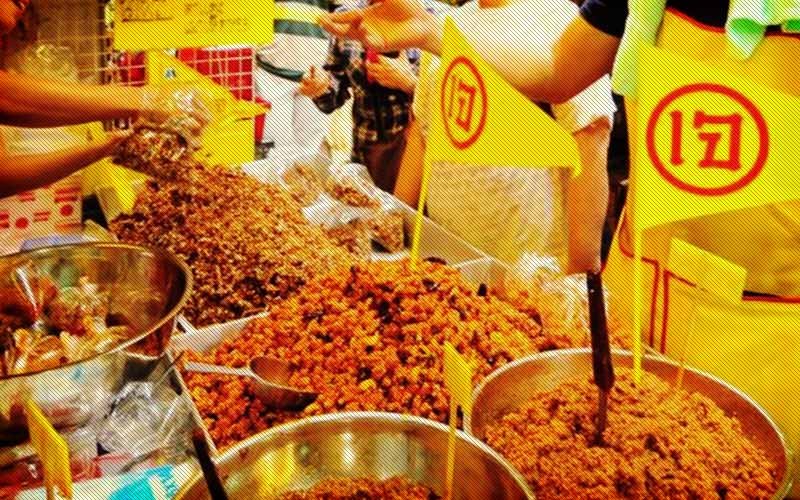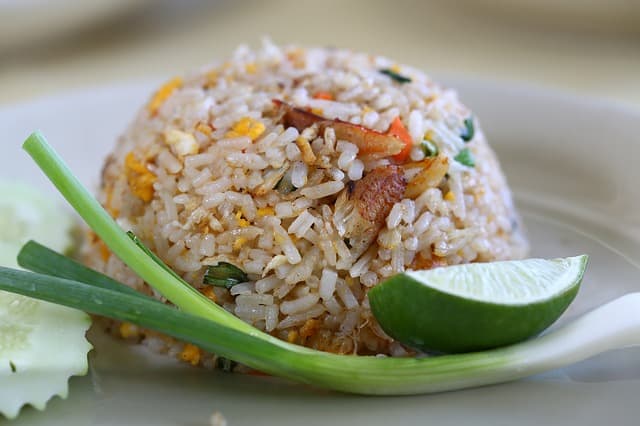With little preparation and knowledge it’s easy to feel overwhelmed and unable to request or identify vegan options in Thailand beyond mango sticky rice and spring rolls. Fortunately Thais are well versed in the concept of veganism, and with patience and perseverance Thailand is an endlessly rewarding destination for food-loving vegans.
The word for vegetarian in Thai is “mangsawirat” (มังสวิรัติ), which includes eggs, but usually doesn’t include dairy since dairy products aren’t traditionally in the Thai diet. If a restaurant serves vegetarian food, it’s likely that a lot of the dishes will be vegan by default. On non-vegetarian menus, there are a lot of Thai dishes that on the surface look suitable for vegans or vegetarians, but do note that fish sauce, oyster sauce or fish pastes are commonly used so it’s best to check that a dish of stir-fried vegetables is actually vegan.
There’s another term for vegetarian which is best for vegans, “Jay” (เจ) – and happily it’s also much easier to say (pronounced “chay”). A “jay” diet is very similar to the restrictions followed in Jainism, so foods cannot contain honey, garlic, onion, or leeks (or any pungent vegetable). Luckily, unlike Jainism, “jay” can have other root vegetables and any type of fruit. “Gin jay” means “I eat vegan” and will be understood wherever you travel in Thailand. Restaurants and dishes labelled vegetarian in English may be “jay” or “mangsawirat” so it’s best to ask.
Jay food stalls are easily recognized by yellow flags hanging around them with Thai script on them in red (เจ), or it may be a Chinese character in red. Essentially, if you see yellow flags with red Thai or Chinese characters hanging on a food stall, it’s vegan. If you happen to be in Thailand during “Tesagan Gin Jay” known as the vegetarian festival in English, you will see these flags in many places. The festival happens for nine days in September or October and in Bangkok it usually centres around Chinatown due to its ties to the Chinese community, a Taoist festival celebrating the Nine Emperor Gods (28 Sept – 7 Oct 2019)

How to ask if food is suitable for vegans and vegetarians in Thailand
First note importance of the gendered polite particles ka and krap, which are appended to sentences in Thai language. If you are a woman, you use ka (sometimes you will hear women also say ha, which is a variant of ka) and if you are a man you use krap (often pronounced more like club or cup). It isn’t mandatory to use these words, but it is an indication of politeness in speech.
Do you have any vegan food?
Mee ahaan jay mai (ka/krap)?
มีอาหารเจไหม
Do you have any vegetarian food?
Mee ahaan mangsawirat mai (ka/krap)?
มีอาหารมังสวิรัติไหม
Typical responses might be:
No, don’t have.
Mai mee (ka/krap)
ไม่มี
No, cannot.
dai mai (ka/krap)
ไม่ได้
Other useful Thai words to know as a vegan
ไก่ = gai = chicken
ไข่ = kai = egg
นม / น้ำนม = nam nom (or just nom) = milk
เนย = nooei = butter
เนื้อสัตว์ = nuua sat = meat
เนื้อ = nuua = meat (beef)
หมู = moo = pork
ลูกแกะ = look gae = lamb
กุ้ง = goong = shrimp
กะปิ = gapi = shrimp paste
ปลา = plaa = fish
น้ำปลา = nam plaa = fish sauce
ปลาร้า = plaa raa = fermented fish paste
ซอสหอยนางรม = sot hooi naang rom = oyster sauce
น้ำผึ้ง = nam pung = honey
เจ = jay = vegan (a colour scheme of red text on a yellow background will distinguish signposts)
อาหารเจ = ahaan jay = vegan food
อาหารมังสวิรัติ = ahaan mangsawirat = vegetarian food
ไม่ใส่ = mai sai (ka/krap) = don’t add/put in (e.g. mai sai nam bplaa)
ไม่เอา = mai ao ka/krap = do not want (e.g. mai ao nuua sat)
ใส่ถุง = sai tung = put in a bag (effectively this is a way to order takeaway)

